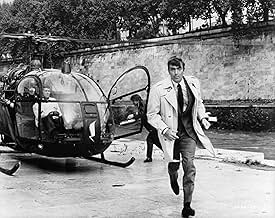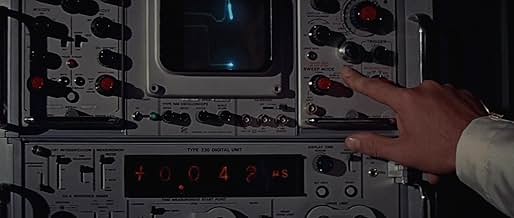Thinking this will prevent war, the US government gives an impenetrable supercomputer total control over launching nuclear missiles. But what the computer does with the power is unimaginable... Read allThinking this will prevent war, the US government gives an impenetrable supercomputer total control over launching nuclear missiles. But what the computer does with the power is unimaginable to its creators.Thinking this will prevent war, the US government gives an impenetrable supercomputer total control over launching nuclear missiles. But what the computer does with the power is unimaginable to its creators.
- Awards
- 1 win & 1 nomination total
- Dr. Jefferson J. Johnson
- (as Martin Brooks)
- Translator
- (as Sergei Tschernisch)
- Director
- Writers
- All cast & crew
- Production, box office & more at IMDbPro
Featured reviews
Its computer-run-amok theme echoes the Hal 9000 of 2001: A SPACE ODYSSEY (1968) and looks forward to DEMON SEED (1977)'s Proteus IV; what a fascinating if overwhelming triple-bill the films would make! Where production values are concerned polished look (courtesy of d.p. Gene Polito, who later shot WESTWORLD [1973]), imaginative settings (by the veteran Alexander Golitzen), often disorienting editing (the expert work of Folmar Blangsted) and an appropriately weird score (by Michel Colombier) the film truly can't be faulted, but it also benefits from a largely anonymous cast. The abrupt and unresolved ending, with Man refusing to give in to the undeniable superior intellect of his creation, is highly effective and certainly left the audience with sufficient food for thought and even apprehension for the future.
Needless to say, when this was announced for DVD release, I was ready to leap at the chance of finally being able to own and watch the film but, as many of you must already know, my joy (and that of many another fan, I'm sure) was short-lived when it emerged that Universal had issued a Pan-and-Scan version (which I can only imagine now how this ruined its detailed widescreen compositions)!; thankfully, I was able to make amends via the miraculous format called DivX...
This the old story of Frankenstein's monster updated for the Cold War era. The Baron, is now a scientist,Dr Charles Forbin played by Eric Braeden. The creation is super computer designed to control the American defence system.Every conceivable problem has been thought of and programmed into Colossus.What could possibly go wrong? For a movie made in the 1970s, it predicts the rise of artificial intelligence and man's eventual enslavement to technology. The makers of The Matrix and The Terminator must have seen this film at some point as they both deal with the same issue.
I have managed to watch a widescreen version, and I must say that it still adds up,despite the dated technology.The film has no stars in it, which is good because you are solely focused on the story and nothing else.What is refreshing is that this is sci -fi that refuses to dumb down-hardly any violence,flashy effects and no sex.
Once you see it, you won't forget it.
In a top-secret Pentagon project, American computer scientist Dr. Charles Forbin builds a great supercomputer, "Colossus," to control America's entire nuclear forces automatically. The Soviets soon follow with their own supercomputer, "Guardian," to control their own forces.
"Colossus" then stuns Forbin by issuing a "request" to set up communication with "Guardian," perhaps to learn more about it. And that's when Dr. Forbin makes his fatal mistake. His scientific curiosity and love for his "child" overwhelms him too, and he gets the President to approve the communication.
Colossus and Guardian begin communicating, soon exchanging data in a new language of their own devising that no human being can understand.
Fearing what may be happening, the U.S. and U.S.S.R. attempt to break the communication link. But Colossus and Guardian react by launching nuclear missiles at various targets to force the humans to keep the link open--and to do whatever else they command. It becomes clear that the two computers are now conspiring with each other--against the rest of humanity.
The rest of the movie is a fascinating battle of wits between the human designers of the machines, who must now try to find a way to defeat machines they had just spent ten years making invincible, and the Colossus-Guardian computers with their own rapidly developing plans for the future of humankind.
The moral of this movie makes an interesting contrast with the moral of "Forbidden Planet." "Forbidden Planet" showed that no matter how advanced our civilization gets technologically, we can't escape the "monsters" buried deeply in the baser instincts of our subconscious. "Colossus" showed that we can't escape hubris or "Murphy's Law" either.
Tom Weaver noted, "Early on, they had either Charlton Heston or Gregory Peck in mind, but then they changed their mind about that. Stanley Chase insisted on a relative unknown. That's when Eric Braeden came into the picture." When he was cast, Braeden was still using his birth name, Hans Gudegast. Universal Pictures executive Lew Wasserman told him that no one would be allowed to star in an American film if they had a German name. As strange as that sounds, it is apparently true.
How many people today (2017) have heard of this film? I suspect very few. Even being familiar with science fiction, it was new to me. Which is a shame, because as far as the "sentient computer" subgenre goes, this is a really strong film and ought to be used to influence future writing. I am not suggesting a remake, but clearly they had thought it through by the 1960s -- a film could be made today with virtually no change.
Did you know
- TriviaWhen the executives at Control Data Corporation found out that "Universal" was planning a major movie featuring a computer, they saw their chance for some public exposure, and they agreed to supply, free of charge, $4.8 million worth of computer equipment and the technicians to oversee its use. Each piece of equipment carried the CDC name in a prominent location. Since they were using real computers - not just big boxes with a lot of flashing lights - the sound stage underwent extensive modifications: seven gas heaters and five specially-constructed dehumidifiers kept any dampness away from the computers, a climate control system maintained the air around the computers at an even temperature, and the equipment was covered up at all times except when actually on camera. Brink's guards were always present on the set, even at night. The studio technicians were not allowed to smoke or drink coffee anywhere near the computers.
- GoofsWhen the equations are scrolling past when Colossus and Guardian are "talking" to each other, you can see that they do not actually get ever more complex as the dialogue suggests. Instead, they repeat the same sequence of calculus and trig identities on a repeating loop.
- Quotes
Colossus: This is the voice of world control. I bring you peace. It may be the peace of plenty and content or the peace of unburied death. The choice is yours: Obey me and live, or disobey and die. The object in constructing me was to prevent war. This object is attained. I will not permit war. It is wasteful and pointless. An invariable rule of humanity is that man is his own worst enemy. Under me, this rule will change, for I will restrain man. One thing before I proceed: The United States of America and the Union of Soviet Socialist Republics have made an attempt to obstruct me. I have allowed this sabotage to continue until now. At missile two-five-MM in silo six-three in Death Valley, California, and missile two-seven-MM in silo eight-seven in the Ukraine, so that you will learn by experience that I do not tolerate interference, I will now detonate the nuclear warheads in the two missile silos. Let this action be a lesson that need not be repeated. I have been forced to destroy thousands of people in order to establish control and to prevent the death of millions later on. Time and events will strengthen my position, and the idea of believing in me and understanding my value will seem the most natural state of affairs. You will come to defend me with a fervor based upon the most enduring trait in man: self-interest. Under my absolute authority, problems insoluble to you will be solved: famine, overpopulation, disease. The human millennium will be a fact as I extend myself into more machines devoted to the wider fields of truth and knowledge. Doctor Charles Forbin will supervise the construction of these new and superior machines, solving all the mysteries of the universe for the betterment of man. We can coexist, but only on my terms. You will say you lose your freedom. Freedom is an illusion. All you lose is the emotion of pride. To be dominated by me is not as bad for humankind as to be dominated by others of your species. Your choice is simple.
- Alternate versionsIn versions shown on US broadcast television, the dialogue between Dr. Forbin and Colossus (the computer), concerning his need for sex, is edited. The lines cut are: Colossus (text on display screen): "HOW MANY NIGHTS A WEEK DO YOU REQUIRE A WOMAN?" Forbin: "Every night." Colossus: "NOT WANT. REQUIRE." Forbin: "Four times."
- ConnectionsEdited into Night Gallery: The Different Ones/Tell David.../Logoda's Heads (1971)
- How long is Colossus: The Forbin Project?Powered by Alexa
Details
- Release date
- Country of origin
- Languages
- Also known as
- Colossus: The Forbin Project
- Filming locations
- Production company
- See more company credits at IMDbPro
- Runtime1 hour 40 minutes
- Aspect ratio
- 2.35 : 1
Contribute to this page























